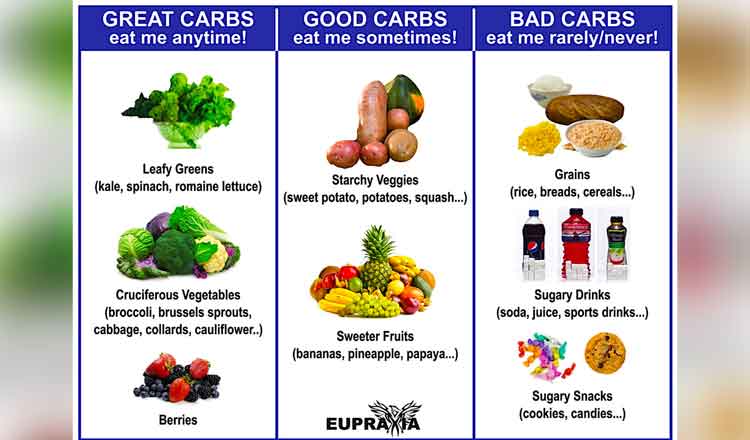Carbohydrates: The good, the bad and the in-between

Brought to you by AIA, the largest life insurer in the world

Have you ever scrolled through social media and came across posts promoting low-carbohydrate intake for a healthier, slimmer figure? If yes, you are likely riddled with other questions regarding its accuracy and effectiveness. Especially when celebrities and models in the likes of Adriana Lima, Kim Kardashian and Halle Berry allegedly swear by it.
It might even trigger the thoughts of trying a low-carbohydrate diet yourself, but perhaps you have not hopped on the bandwagon because you need more information on its pros and cons. Well, fret not, because we have your back.
..
ADS by Cloud 9:
.
– SPACE RESERVE FOR YOUR ADVERTISEMENT –
.
.
While the decision to opt for a specific kind of diet is entirely yours, it is best to understand the nutritional components that make up a balanced diet and why they matter to your overall wellness. It is also advisable to consult a dietitian to help formulate meal plans that suit your bodily needs.
.
..
ADS by Cloud 9:
.
– SPACE RESERVE FOR YOUR ADVERTISEMENT –
.
.
But first, what are carbohydrates?
Also known as “carbs”, it is one of the main nutrients that a body requires. The body digests carbohydrate and converts it into glucose (sugar in blood stream), which will then be translated into energy for optimum bodily functions. Excess of carbs can be also stored by your body as fat.
You can find carbohydrates in various kinds of food items. They are typically in the form of sugar, starches or fibres. Depending on their molecular structures, they can be further divided into two categories: simple and complex carbohydrates.
.
..
ADS by Cloud 9:
.
– SPACE RESERVE FOR YOUR ADVERTISEMENT –
.
.
Simple carbohydrates
Simple carbohydrates are digested quickly by the body. Upon consumption, the glucose in them will immediately rush into our bloodstream. Basically, they provide quick, little bursts of fuel only to have it depleted just as fast. Naturally, simple carbohydrates can be found in food such as fruits and dairy products. You can also find them in food containing processed and refined sugars such as candy and soft drinks. However, since the latter lacks any nutritional values, it can lead to weight gain.
Bad simple carbs: soda, breakfast cereal, baked goods.
.
..
ADS by Cloud 9:
.
– SPACE RESERVE FOR YOUR ADVERTISEMENT –
.
.
Complex carbohydrates
This is the better option. Complex carbohydrates are digested more slowly by the body. This means your body gets a steadier supply of energy and a lower release of glucose into the bloodstream. Similarly to simple carbohydrates, there are certain foods under this category that are better than others. Opt for unrefined grains as they contain essential nutrients and are rich in fiber. On the other hand, most refined grains such as white flour, sugar and white rice are generally stripped off of vital nutrients like vitamin B.
Good complex carbs: whole grains, beans, leafy greens.
. …
ADS by Cloud 9:
.
– SPACE RESERVE FOR YOUR ADVERTISEMENT –
.
.
Myths surrounding carbohydrates
1. Carbs make you fat
Carbs alone do not make you put on weight. The same goes for any other types of nutrients. The key to maintaining an ideal weight is to ensure your food intake is at par with the amount of energy you use. The more calorie you burn, the lower your risk for obesity is.
2. Only bread and grains contain carbs
Probably the most common misconception is that only pasta, rice and bread are laden with carbohydrates. While this is true for all three, there are many other food items that contain a similar amount, if not more, carbohydrates such as dairy products, fruits, grains, nuts, legumes and sugary food.
3. Protein is more important than carbs
While protein is just as important when it comes to muscle-training, studies have shown that higher carb intake can trigger a higher metabolism rate. It is also reported that protein and carbs work effectively together to break down sugar. No one nutrient can fully replace another, which is why a balanced diet is still preferable.
.
..
ADS by Cloud 9:
.
– SPACE RESERVE FOR YOUR ADVERTISEMENT –
.
.
So, to carb or not to carb?
According to award-winning British dietitian Sian Porter, carbohydrates are such a broad category and people need to know that not all carbs are the same. She said it is the type, quality and quantity of carbohydrate in our diet that is important.
“While we should reduce the amount of free sugar in our diet, we should base our meals on starchy carbs, particularly the higher fiber varieties. There is strong evidence that fiber, found in wholegrain versions of starchy carbs for example, is good for our health.”
Regardless, carbohydrates are the body’s primary source of energy. While human bodies can survive without sugar, cutting off carbohydrates completely from your diet could be detrimental to your long-term health, as various researches showed.
Technically, your body can still fuel up from protein and fat in the absence of glucose. However, if not careful, this mindset could lead you to resort to a higher saturated fat intake which is a major risk factor for heart disease.
With the emergence of many low-carb diets in recent years, it is important to embrace one that caters to your own needs. What works for another person might not for you, so it is best to do a thorough research before committing to one. It is not recommended that you opt for a carb-free lifestyle, but if you do, you have to find healthy alternatives to make-up for the nutritional absence.
..
ADS by Cloud 9:
.
– SPACE RESERVE FOR YOUR ADVERTISEMENT –
.
.










